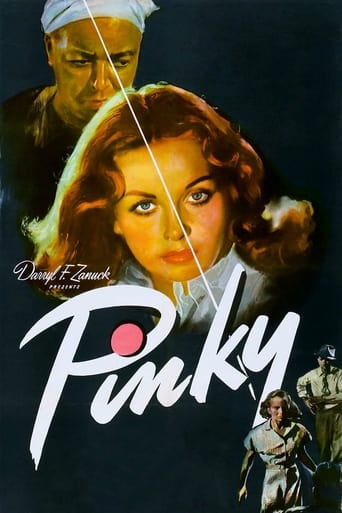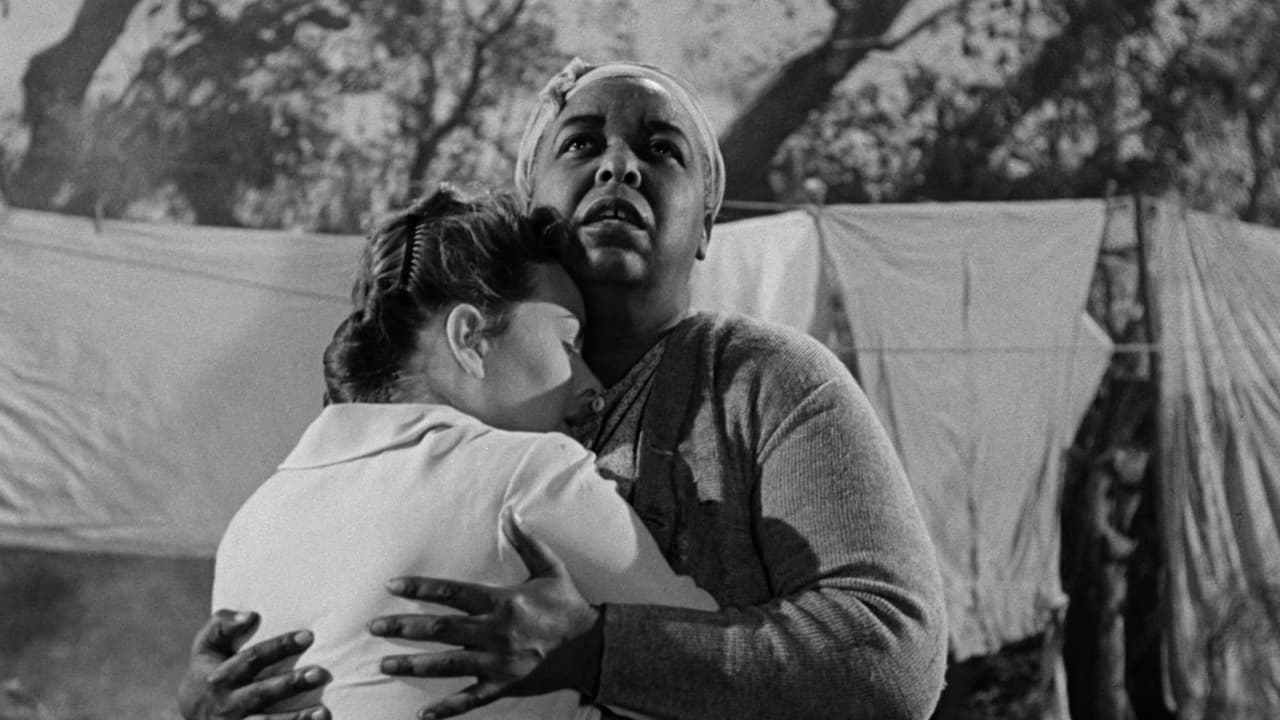Robert J. Maxwell
John Ford is said to have directed part of this but, as it developed, he and Ethel Waters couldn't stand one another and Ford turned the helm over to Elia Kazan. (It doesn't look typical of the work of either man.) Basically, the eponymous character is a registered nurse who has left her job in Boston and returned to her childhood home in the African-American neighborhood of a rural Southern town. She lives with her black grandmother although Pinky herself couldn't look more "white" if she'd been Jeanne Crain or somebody.At first, as Crain wanders about the little town, folks think she's white but when it is revealed that she has a black grandmother, Ethel Waters, she's treated with the amiable disdain blacks in the rural South had to get along with in 1949.The scene in which her True Colors are revealed is emblematic. Crain visits a black man in the seedier part of the colored neighborhood. Taking note of this, a young black woman is seized with jealousy. An altercation erupts. The redneck cops arrive and break up the fight, and when the black woman says something like, "She ain't nothing but a colored gal herself," the cops slap her around. The Head Cop turns to Crain and asks with a chuckle, "It ain't true, is it?" Upon finding that it IS, the cops slap CRAIN around! It's interesting, from a sociological point of view, that Jeanne Crain, despite her severe hair style, looks and acts as white as any of the good townsfolk. It's that drop of black blood that is the criterial attribute. Genetically she may be only one sixteenth African, but she's coded as "colored" by everyone who knows about it. This is known as "the social construction of reality." She's colored not because she's mostly of African descent but because everyone agrees that she's colored. The same is true of Halle Berry (half "white") and Barack Obama (our first "black" president).Jeanne Crain as Pinky demonstrates her range as an actress, which isn't much but isn't dismissable either. She's a beautiful woman and in "Leave Her To Heaven", a few years earlier, was radiant. But there she was cheerful and self contained, and here she's sullen and pouting -- and that's about it. Ethel Waters gets the job done. Ethel Barrymore does rather more than that, and the supporting players do a professional job.One thing that struck me is that, except for a couple of incidents, race really played little part in the story. An outsider from Boston disrupts the little town and insinuates herself into the good graces (and the will) of the town's richest dying old lady. The mansion and its contacts go to the damned Yankee nurse instead of the local folks who know tradition when they see it.No one should be ashamed of his or her participation in this production. It's the product of seasoned talent, except for Elia Kazan who was just getting started. It doesn't preach. There are no Big Speeches about racism. In fact, the retired judge who sees to it that Crain gets Barrymore's mansion leaves her, saying that the outcome of the trial contesting the will, though it has gotten Crain the crumbling mansion, will bring no advantages to the community. That thought is insightful and neatly expressed.The denouement is improbable in the extreme. It's unlikely that Pinky would decide to stay in that rude community, much less turn her old mansion into a school for children. And it's frankly IMPOSSIBLE that when her white doctor boyfriend from Boston arrives, eager for marriage, she would throw him out and decide to stay with "her own kind." A NURSE -- rejecting an opportunity to marry a DOCTOR? The last shot has the camera descend on Crain's glowing face as she rings the bell for Em's School For Girls to start. A heavenly choir may be heard. She's found fulfillment. That happily sentimental shot could have come from John Ford, who sides with tradition even if nobody else does.
skiddoo
Before I saw this movie I thought Pinky should have been played by a Black actress but after watching it I think seeing a White treated like a Black made a much bigger impact on White audiences that were used to, one might say calloused to, Blacks being treated badly. Poor Tom. He loved her but he just didn't get it. Pinky's life was totally outside his frame of reference and he didn't even consider that if they had children it might make his tidy plans blow up in his face.I think this movie has a subtle grasp of race relations that was a credit to the writing, acting, and directing.I wonder what happened to the characters in the oncoming civil rights struggle. The movie necessarily doesn't have a happily ever after ending because it is set firmly in reality and we know too much about future events. Today's audiences might find it ominous that only one White person, the doctor, was even marginally on her side. It would be extremely easy for a small mob to destroy everything. The ending shot with Pinky by the signpost made me feel how alone she was despite being surrounded by people.
MartinHafer
Although Twentieth-Century Fox's "Gentlemen's Agreement" won the Oscar for Best Picture and Best Director in 1947, "Pinky" (also by Fox and director Elia Kazan) is a message film that seems to have better withstood the test of time and is, in my opinion, a more watchable film--and probably a lot more daring in its day.Pinky is a young nursing school graduate played by Jeanne Crain. After spending the last three years up North studying, she has come home to visit with her grandmother (Ethel Waters)...a Black woman. It seems that for the last three years, the very white-skinned Crain has been posing as White...and you certainly can't blame her in light of the second-class status (or less) afforded to Black-Americans at the time.The first day she goes into town, she is arrested (though she was doing nothing illegal), given a "talkin' to" by the Judge and almost raped on the way home! In light of this, you can certainly understand her wanting to leave as soon as possible and get away from this hellish Southern town. However, something intervenes. Grandma wants Pinky to stay a bit and take care of their neighbor, Miss Em (Ethel Barrymore). Pinky could care less, though, if and when Miss Em dies--as she's just another despicable White lady. Grandma shames Pinky into staying and helping Miss Em to die--after all, if she doesn't help, Grandma promises to knock her silly! All Pinky can remember are bad things about Miss Em, though Grandma's recollections are far different--telling Pinky that Miss Em is a good woman and they owe her for her past kindness. Pinky doesn't believe it, but doesn't want to disappoint Grandma or get whooped, so she goes to Miss Em's mansion to care for her. Surprisingly, after a very rocky start, the two women develop respect for each other.Some time later, Miss Em dies and the full extent to which she cared for Pinky is now apparent. Just before dying, Miss Em left her estate to Pinky! The problem, however, is that Miss Em's closest relative is an evil and selfish lady, Melba (Evelyn Varden--who was great playing horrible women in this film and others like "The Bad Seed"), contests the will. In addition, Melba is a racist and does what she can to stir up resentment in the community. What will Pinky do? Can she get a fair shake in this terrible town? Is it worth staying and fighting for what is rightfully hers? Tune in and see.I loved the film because it dared to talk about racism. The way many White-Americans treated Blacks was disgraceful and was finally being addressed by Hollywood in films like this and "Intruder in the Dust" (also 1949). Other related topics such as interracial marriage, bitterness within Black-America due to racism and rape were also brought into the film--making it a very, very daring film. I am sure it did not play in many towns in the US and had to have been met with hostility by some. However, because the acting, direction and script were all top-notch, it managed to counter the pin-heads out there, as it's hard to see the film and not be led to see the evil and injustice that was rampant in some parts of the country.A must-see and a unique and powerful film.
funkyfry
While not a bad film by any means, Kazan's "Pinky" is guilty of over-reaching. There are simply too many elements in the dramatic stew. Pinky (Jeanne Crain) returns home from a long period of education and travel to stay with her kindly grandmother (Ethel Waters). While Pinky finds the Southern hospitality unbearable for one of her skin color, her granny convinces her to stay so that she can nurse the ornery local matriarch Miss Em (Ethel Barrymore) back to health. When Miss Em leaves Pinky her property, a bitter legal struggle ensues.The biggest problem with the film is the absurd casting of Jeanne Crain as the young protagonist. While I'm not against cross-racial casting and I don't consider it inherently wrong or in poor taste, I do think this was a film that could not work with that type of casting. It's simply impossible to take Jeanne Crain seriously when she's shouting things like "I'm a Negro!" or when she's talking about "my people." The two great Ethels try their best of course to lift the basic melodrama into some kind of rarefied Broadway territory, and halfway succeed. But the story itself is problematic in my opinion. We can't get any real sympathy for the boyfriend (William Lundigan), because he's such a stuffed shirt and he wants Pinky to continue playing white. Worse of all is the fact that the conclusion, where Pinky starts a nursing school, is ridiculously obvious halfway through the film yet it's treated as a great revelation.While raised to a certain point by the good performances and solid direction by Kazan, the film is mired in its own self-seriousness. The look of the film is cheap and stage-bound, recycling the manor house from "Gone With the Wind" and never opening up to anything cinematic. The best thing that can really be said for it, is that it taught Kazan some lessons about directing actors that he probably put to better use in subsequent films.



 AD
AD


